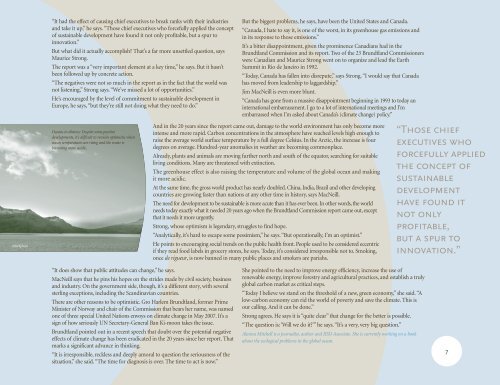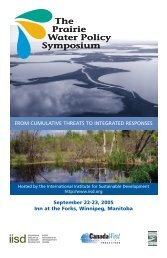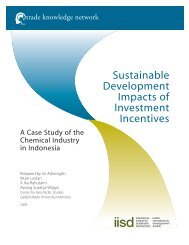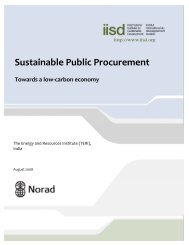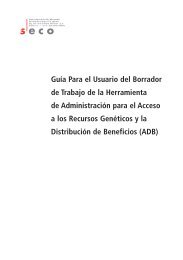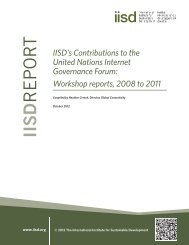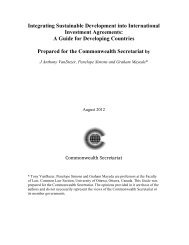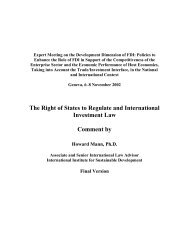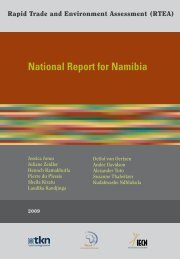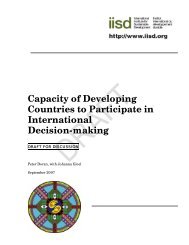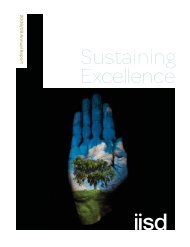2006/2007 Annual Report - International Institute for Sustainable ...
2006/2007 Annual Report - International Institute for Sustainable ...
2006/2007 Annual Report - International Institute for Sustainable ...
Create successful ePaper yourself
Turn your PDF publications into a flip-book with our unique Google optimized e-Paper software.
iStockphoto<br />
“It had the effect of causing chief executives to break ranks with their industries<br />
and take it up,” he says. “Those chief executives who <strong>for</strong>cefully applied the concept<br />
of sustainable development have found it not only profitable, but a spur to<br />
innovation.”<br />
But what did it actually accomplish? That’s a far more unsettled question, says<br />
Maurice Strong.<br />
The report was a “very important element at a key time,” he says. But it hasn’t<br />
been followed up by concrete action.<br />
“The negatives were not so much in the report as in the fact that the world was<br />
not listening,” Strong says. “We’ve missed a lot of opportunities.”<br />
He’s encouraged by the level of commitment to sustainable development in<br />
Europe, he says, “but they’re still not doing what they need to do.”<br />
Oceans in distress: Despite some positive<br />
developments, it’s difficult to remain optimistic when<br />
ocean temperatures are rising and the water is<br />
becoming more acidic.<br />
But the biggest problems, he says, have been the United States and Canada.<br />
“Canada, I hate to say it, is one of the worst, in its greenhouse gas emissions and<br />
in its response to those emissions.”<br />
It’s a bitter disappointment, given the prominence Canadians had in the<br />
Brundtland Commission and its report. Two of the 23 Brundtland Commissioners<br />
were Canadian and Maurice Strong went on to organize and lead the Earth<br />
Summit in Rio de Janeiro in 1992.<br />
“Today, Canada has fallen into disrepute,” says Strong. “I would say that Canada<br />
has moved from leadership to laggardship.”<br />
Jim MacNeill is even more blunt.<br />
“Canada has gone from a massive disappointment beginning in 1993 to today an<br />
international embarrassment. I go to a lot of international meetings and I’m<br />
embarrassed when I’m asked about Canada’s (climate change) policy.”<br />
And in the 20 years since the report came out, damage to the world environment has only become more<br />
intense and more rapid. Carbon concentrations in the atmosphere have reached levels high enough to<br />
raise the average world surface temperature by a full degree Celsius. In the Arctic, the increase is four<br />
degrees on average. Hundred-year anomalies in weather are becoming commonplace.<br />
Already, plants and animals are moving further north and south of the equator, searching <strong>for</strong> suitable<br />
living conditions. Many are threatened with extinction.<br />
The greenhouse effect is also raising the temperature and volume of the global ocean and making<br />
it more acidic.<br />
At the same time, the gross world product has nearly doubled. China, India, Brazil and other developing<br />
countries are growing faster than nations at any other time in history, says MacNeill.<br />
The need <strong>for</strong> development to be sustainable is more acute than it has ever been. In other words, the world<br />
needs today exactly what it needed 20 years ago when the Brundtland Commission report came out, except<br />
that it needs it more urgently.<br />
Strong, whose optimism is legendary, struggles to find hope.<br />
“Analytically, it’s hard to escape some pessimism,” he says. “But operationally, I’m an optimist.”<br />
He points to encouraging social trends on the public health front. People used to be considered eccentric<br />
if they read food labels in grocery stores, he says. Today, it’s considered irresponsible not to. Smoking,<br />
once de rigueur, is now banned in many public places and smokers are pariahs.<br />
“Those chief<br />
executives who<br />
<strong>for</strong>cefully applied<br />
the concept of<br />
sustainable<br />
development<br />
have found it<br />
not only<br />
profitable,<br />
but a spur to<br />
innovation.”<br />
“It does show that public attitudes can change,” he says.<br />
MacNeill says that he pins his hopes on the strides made by civil society, business<br />
and industry. On the government side, though, it’s a different story, with several<br />
sterling exceptions, including the Scandinavian countries.<br />
There are other reasons to be optimistic. Gro Harlem Brundtland, <strong>for</strong>mer Prime<br />
Minister of Norway and chair of the Commission that bears her name, was named<br />
one of three special United Nations envoys on climate change in May <strong>2007</strong>. It’s a<br />
sign of how seriously UN Secretary-General Ban Ki-moon takes the issue.<br />
Brundtland pointed out in a recent speech that doubt over the potential negative<br />
effects of climate change has been eradicated in the 20 years since her report. That<br />
marks a significant advance in thinking.<br />
“It is irresponsible, reckless and deeply amoral to question the seriousness of the<br />
situation,” she said. “The time <strong>for</strong> diagnosis is over. The time to act is now.”<br />
She pointed to the need to improve energy efficiency, increase the use of<br />
renewable energy, improve <strong>for</strong>estry and agricultural practices, and establish a truly<br />
global carbon market as critical steps.<br />
“Today I believe we stand on the threshold of a new, green economy,” she said. “A<br />
low-carbon economy can rid the world of poverty and save the climate. This is<br />
our calling. And it can be done.”<br />
Strong agrees. He says it is “quite clear” that change <strong>for</strong> the better is possible.<br />
“The question is: ‘Will we do it?’” he says. “It’s a very, very big question.”<br />
Alanna Mitchell is a journalist, author and IISD Associate. She is currently working on a book<br />
about the ecological problems in the global ocean.<br />
7


